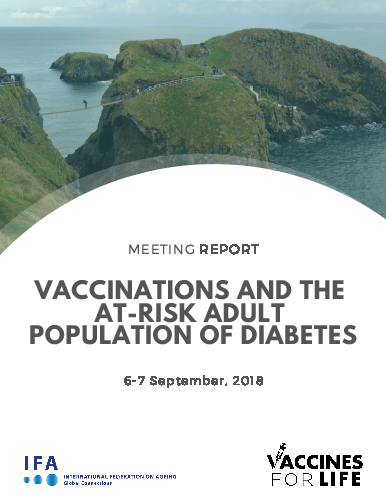At-Risk Groups
 Parallel to the world’s ageing population is the increasing global prevalence of non-communicable diseases (NCDs), with 80% of global deaths resulting from NCDs such as cardiovascular diseases, cancer, diabetes and respiratory diseases.7 These growing populations are more vulnerable to infectious diseases such as influenza and pneumonia, and risk serious complications as a result.8 Infectious diseases increase the risk of hospitalization, disability and death among older people and adults with NCDs, and are associated with a loss of functional ability and autonomy.9
Parallel to the world’s ageing population is the increasing global prevalence of non-communicable diseases (NCDs), with 80% of global deaths resulting from NCDs such as cardiovascular diseases, cancer, diabetes and respiratory diseases.7 These growing populations are more vulnerable to infectious diseases such as influenza and pneumonia, and risk serious complications as a result.8 Infectious diseases increase the risk of hospitalization, disability and death among older people and adults with NCDs, and are associated with a loss of functional ability and autonomy.9
People with diabetes, as an example, often deal with additional chronic conditions which together result in a weakened immune system, lowering their defenses against vaccine preventable diseases. Similarly, respiratory infection is associated with increased in-hospital mortality rates10, and is estimated to trigger 50% of heart failure exacerbations.11
Despite this evidence, the value of vaccines for adults with chronic diseases is underappreciated and vaccine coverage is well below acceptable levels. Vaccination rates vary among people with NCDs in part because prevention is not prioritized appropriately in care, and vaccination is not seen as an overriding concern when also dealing with the daily effects of NCDs. If people with NCDs viewed vaccination not as a decision, but as a given, higher rates of vaccination among disease-specific groups may prevail.
Last revision: 23 April 2020
7WHO, 2018. Noncommunicable diseases. Retrieved from: https://www.who.int/news-room/fact-sheets/detail/noncommunicable-diseases
8Pera, A., Campos, C., López, N., Hassouneh, F., Alonso, C., Tarazona, R., & Solana, R. (2015). Immunosenescence: implications for response to infection and vaccination in older people. Maturitas, 82(1), 50-55.
9Doherty, T. M., Connolly, M. P., Del Giudice, G., Flamaing, J., Goronzy, J. J., Grubeck-Loebenstein, B., … Di Pasquale, A. (2018). Vaccination programs for older adults in an era of demographic change. European geriatric medicine, 9(3), 289–300. doi:10.1007/s41999-018-0040-8
10Ciszewski A. Cardioprotective Effect of Influenza and Pneumococcal Vaccination in Patients with Cardiovascular Diseases. Vaccine 2018:36(2):202-206
11Bhatt AS, DeVore AD, Hernandez AF and Mentz RJ. Can Vaccinations Improve Heart Failure Outcomes?: Contemporary data and future directions. JACC: Heart Failure 2017:5(3):194-203.









